Conga has earned its place as one of the most recognized names in contract management, but it’s not the only option out there.
Many teams appreciate its automation and Salesforce integration, yet others find it too complex, too expensive, or just not the right fit for how they work.
If you’re comparing tools, several Conga competitors now offer a simpler, faster, and more flexible approach to managing contracts.
Some focus on AI-assisted drafting and others on better collaboration, but all share the same goal of making contract work easier and more efficient.
So, which one does your team truly need?
In this guide, we’ll look at what Conga does best, why some teams look for alternatives, and which platforms stand out as strong contenders in 2025.
Conga Contracts, or simply known as Conga, is a contract lifecycle management (CLM) and document automation platform designed to simplify how businesses create, manage, and execute agreements.
It connects people, processes, and data across departments (like legal, finance, and sales) so teams can move contracts from draft to signature with little to no manual steps.
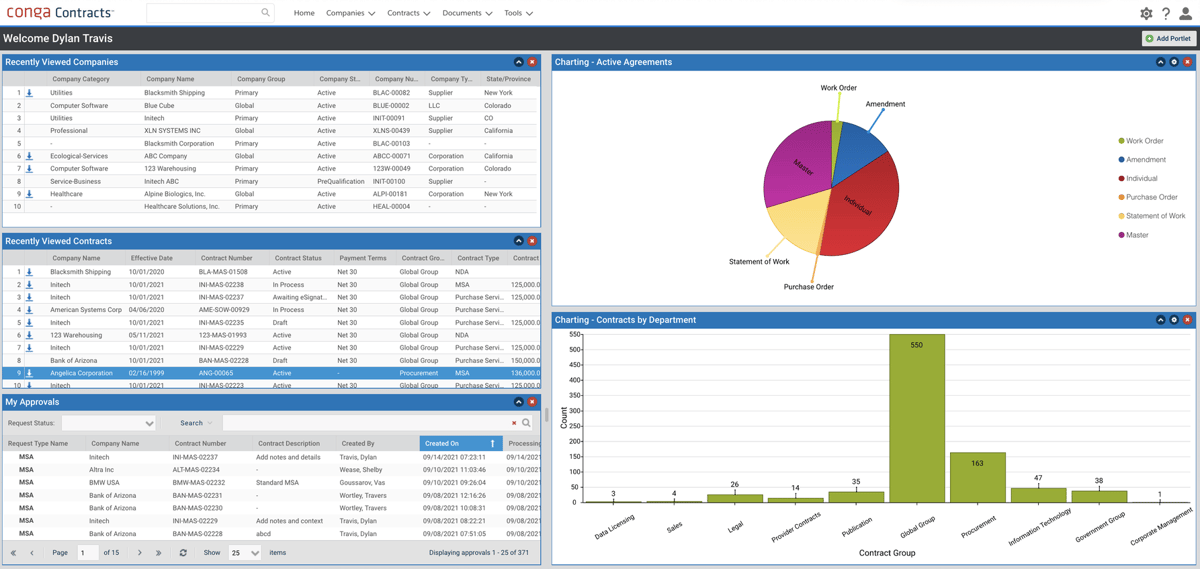
The platform is best known for its document generation and workflow automation, which often helps organizations replace repetitive tasks with digital systems that maintain accuracy and compliance.
It also includes Conga Sign, a built-in electronic signature solution that allows users to complete contract approvals directly inside the platform, without switching to third-party tools.
In short, Conga helps companies handle every stage of a contract’s lifecycle while keeping everything in sync with CRM data like Salesforce.
Conga handles contract automation well, but not every business needs something that complex. Many teams in the CLM space start searching for an alternative when they want tools that are easier to use, faster to set up, and friendlier for everyday work.
Here’s what usually drives that switch:
If you want something simpler and faster, a Conga competitor with built-in automation and automated workflows can make a big difference. Let's take a look at some options.
The CLM space has grown fast, and several platforms now match or surpass Conga in usability, automation, and flexibility. Here are seven Conga competitors worth checking out if you’re looking to make contract management faster and less complicated.
Aline brings together everything teams need to handle contracts in one intelligent platform. It’s built for companies that want to move away from using multiple apps and spreadsheets and start working with a single, connected system that actually keeps pace with their business.
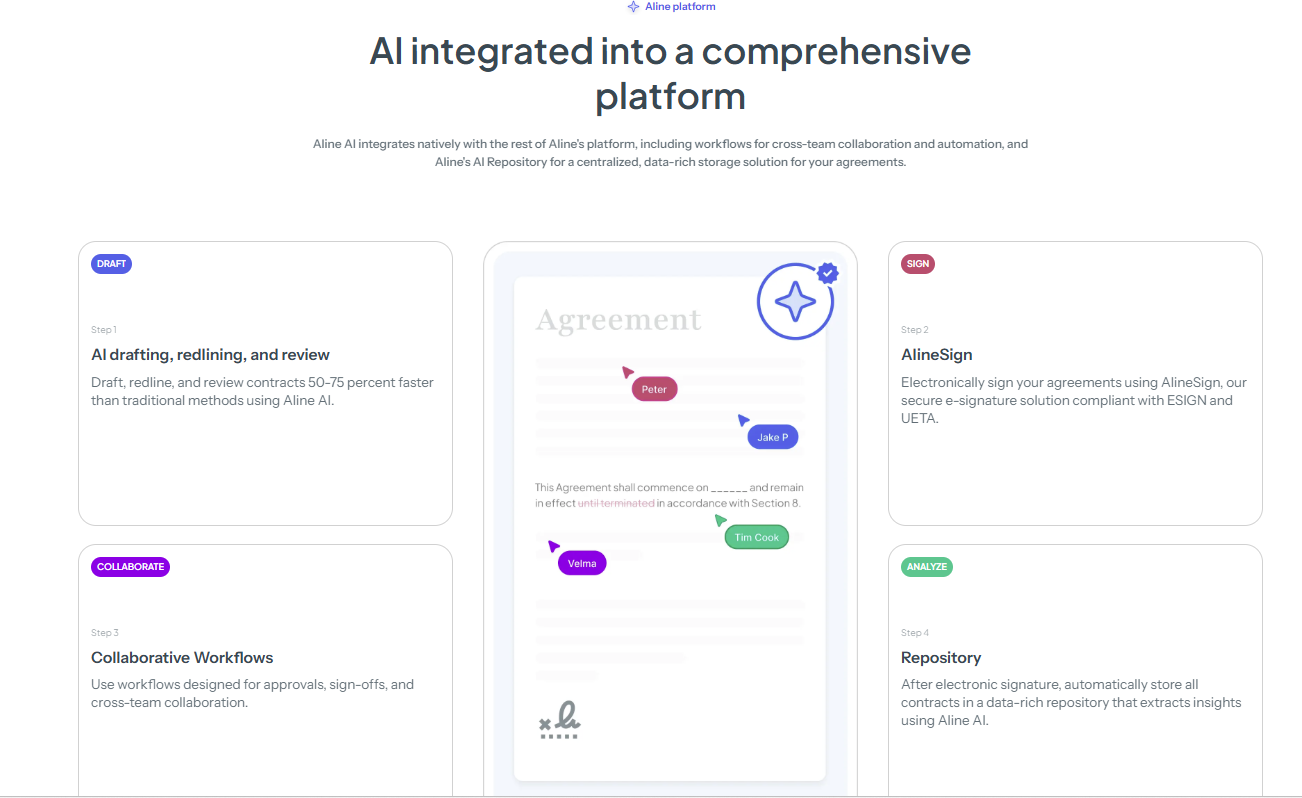
More than 2,000 organizations already rely on Aline to keep contracts organized, obligations tracked, and insights accessible when they’re needed most. Its AI features handle the repetitive work, which gives teams more time to focus on high-value tasks.
Whether you’re reviewing a vendor agreement or analyzing thousands of contracts at once, Aline keeps things simple, fast, and secure.
Plus, what sets Aline apart is how natural it feels to use. It combines legal precision with a design that anyone can navigate. You don’t need technical expertise to get started — the platform’s no-code setup and AI-powered tools do the heavy lifting.
To put it simply, Aline takes the complexity out of managing contracts and turns it into a smooth, organized process your whole team can rely on.
Start your free trial today and see how it all works.
HyperStart is a CLM tool suitable for teams that need efficiency without overcomplication. It focuses on helping sales and legal teams handle contracts faster through automation, structure, and simple customization.
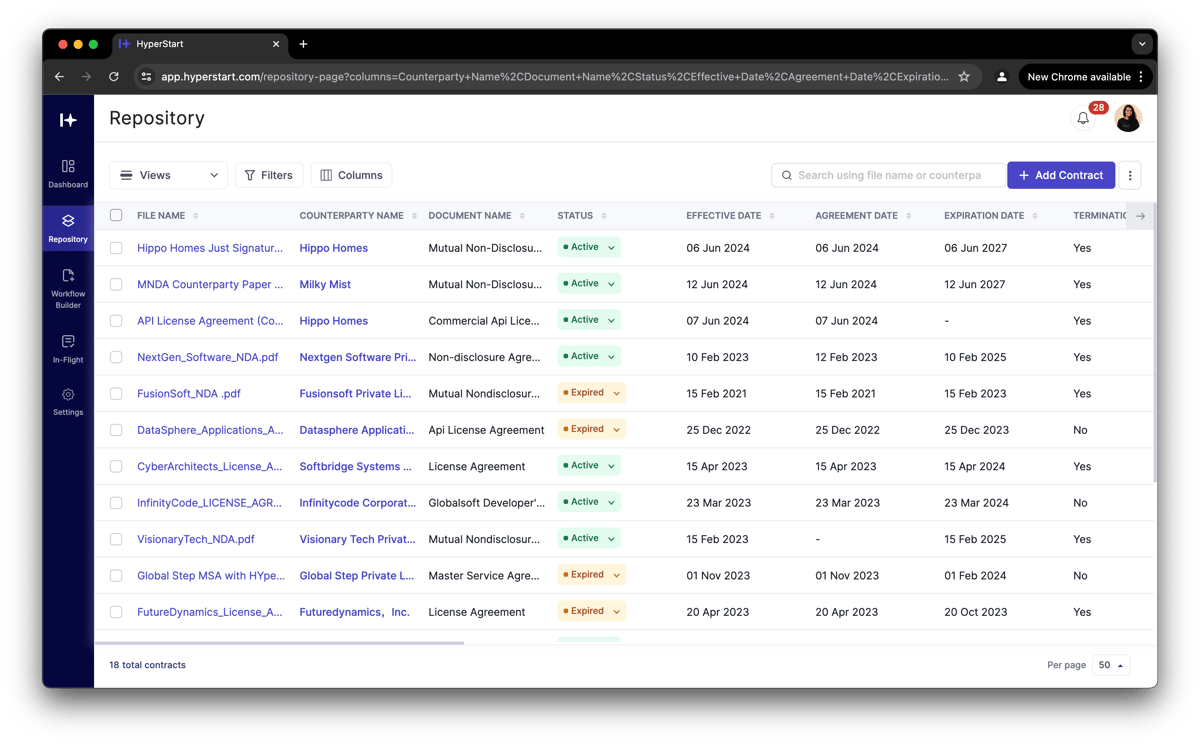
With HyperStart, you can create, approve, and manage signed agreements from one dashboard. The platform makes it easy to generate document templates that reflect your company’s brand and adjust automatically through conditional logic, so each contract fits the deal at hand.
This CLM platform also supports seamless integration with popular business tools to help keep your data connected and consistent.
Agiloft is a long-standing name in contract management, known for its flexibility and depth. It’s designed for organizations that want complete control over how contracts move through their systems, from contract generation to ongoing management.

What makes Agiloft stand out is its ability to fit into complex business systems without losing ease of use. Its automation capabilities and essential features help teams manage agreements efficiently, even at a large scale.
Plus, Agiloft supports detailed approval processes and integrates with CRMs, ERPs, and accounting software, which keeps every part of the entire sales process connected. It also supports multiple file formats to make document creation and collaboration smooth for global teams.
And with strong analytics and tracking tools, users can monitor performance, renewal timelines, and key metrics across thousands of contracts.
CobbleStone Software is a contract management platform aimed at organizations that deal with high volumes of agreements and detailed compliance requirements.
Essentially, it helps businesses streamline complex business processes by combining document creation, approvals, and post-signature tracking in one system.
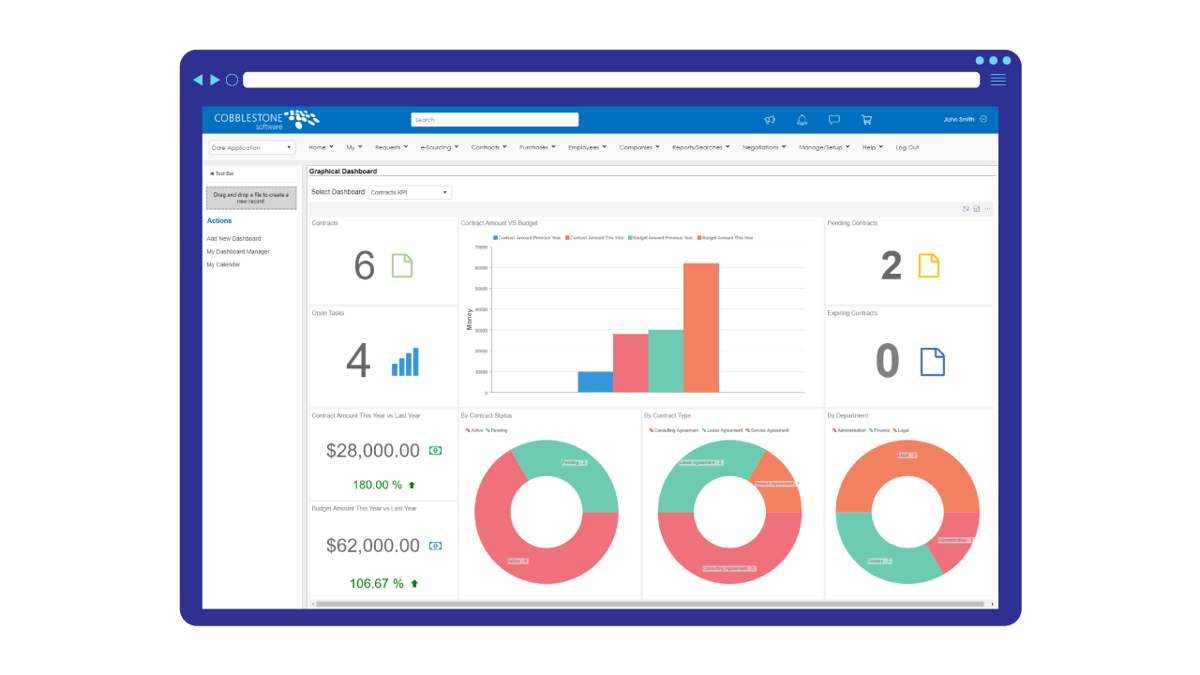
Known for its reliability and adaptability, CobbleStone is often used in government, healthcare, and enterprise settings where precision and oversight matter most.
The platform supports professional-looking documents through customizable templates and allows users to send documents for review or signature directly within the system.
It also connects easily with CRM platforms and other enterprise tools, so it's quite simple to keep contracts aligned with sales and procurement data.
Beyond creation and signing, CobbleStone provides advanced insights that help teams monitor performance, deadlines, and compliance status.
While its feature set is broad, the platform maintains an easy-to-use interface that allows both legal and non-legal users to handle contracts with confidence.
DocuSign CLM extends the capabilities of the well-known e-signature platform into a full contract management system.
It connects document creation, negotiation, signing, and tracking into one organized workflow. Hence, it's a natural choice for businesses already using DocuSign eSignature.
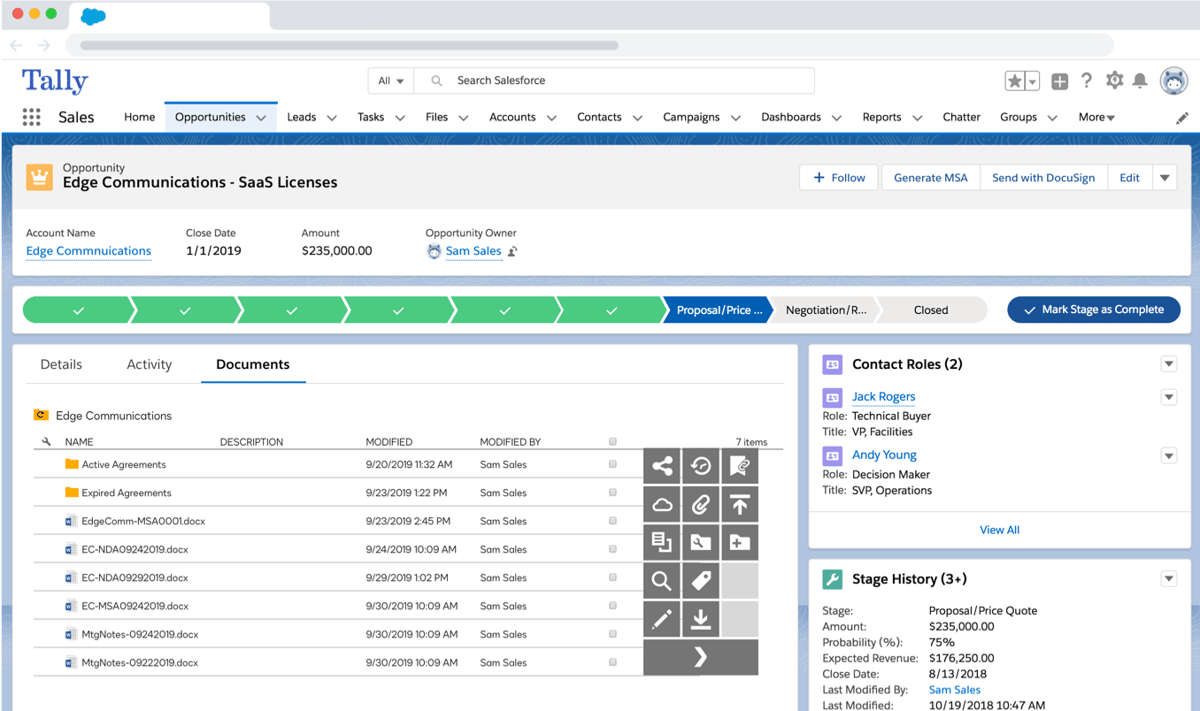
The platform is designed for sales, legal, and procurement teams that want to move contracts faster while keeping every step visible. Users can generate proposals, send contracts for review, and finalize deals with built-in automated alerts that track every stage.
DocuSign CLM also includes API access that allows companies to customize integrations with their own CRMs, ERPs, and billing tools. This is a feature appreciated by growing organizations that need flexibility.
While Conga Sign users might find similarities in workflow structure, DocuSign CLM tends to stand out for its mature e-signature ecosystem and global reliability.
Other tools like Adobe Acrobat Sign, OneSpan Sign, and Dropbox Sign compete in the same digital signing space, but DocuSign CLM offers a deeper layer of contract lifecycle management beyond the signature stage.
Icertis is a contract lifecycle management platform built for organizations that need structure, analytics, and visibility across thousands of contracts.
It’s trusted by large enterprises but has also become a solid option for businesses seeking advanced contract lifecycle automation and compliance tools.
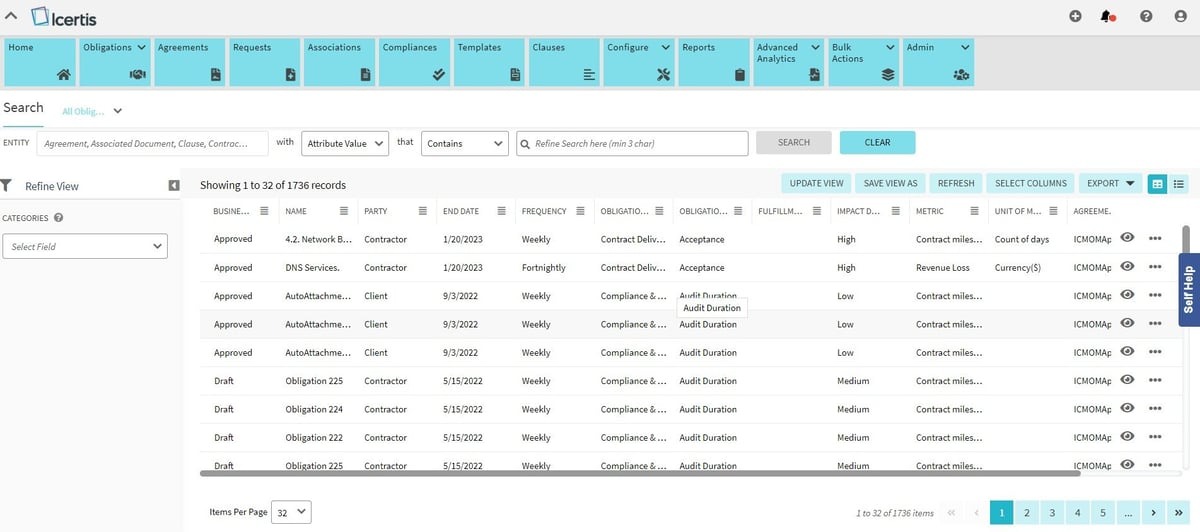
The platform’s strength lies in how it connects legal, procurement, and finance teams under one digital workflow. Used right, it helps companies manage complex agreements without losing transparency.
Additionally, Icertis makes it easy to identify bottlenecks in the contracting process with dashboards that track review times, pending approvals, and renewal cycles.
It also includes smart intake forms that standardize how new contract requests are submitted to maintain consistency across departments. Teams can collaborate through built-in tools that support real-time collaboration, making edits and comments directly in shared workspaces.
For smaller teams or a small business looking for scalability, Icertis may feel more advanced than necessary. But for growing companies managing high contract volumes, its analytical depth and automation features deliver lasting value.
Juro is a modern contract management platform known for its simplicity and clean design. It helps teams handle contracts quickly without needing legal or technical expertise.
With everything running inside a browser, Juro brings drafting, negotiation, signing, and tracking together in a single workspace that’s easy for anyone to use.
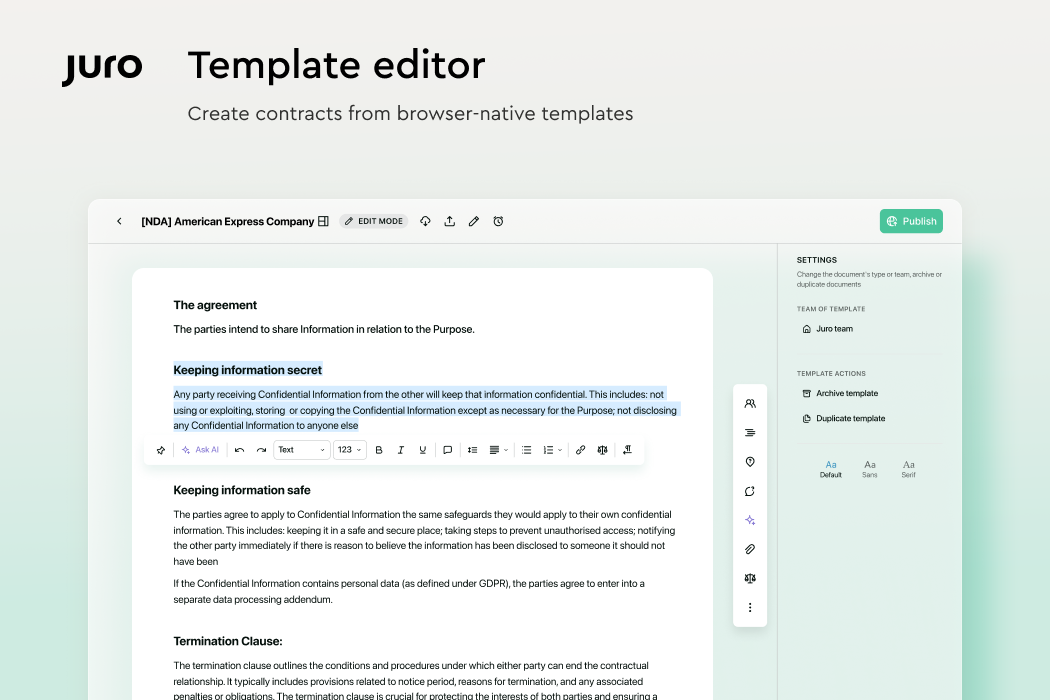
The platform is popular among sales professionals and fast-growing companies that want to shorten deal cycles. It allows teams to create, approve, and finalize contracts directly in Juro.
Real-time editing, version tracking, and structured data fields make collaboration straightforward, especially for teams that manage a high number of routine agreements.
Juro’s focus on clarity means every document remains accessible and consistent across the company. Teams can generate and send contracts in minutes, monitor signing progress, and access full histories for each agreement, all in one intuitive dashboard.
All the tools on this list can handle contracts, but Aline feels different.
It doesn’t try to reinvent your process; it refines it. The platform blends automation, collaboration, and oversight in a way that feels natural and lets teams stay focused. Every step feels connected, every update easy to follow.

When contracts start to pile up or progress stalls, Aline brings order without slowing things down. Reviews move faster, communication stays clear, and your teams can see exactly where things stand.
In other words, it’s modern contract management that actually works the way people do.
Sign up for free to discover its potential.
Conga and Apttus merged in 2020 under the Conga brand. While Apttus originally focused on quote-to-cash and revenue operations, Conga expanded that foundation into a broader suite that includes contract lifecycle management and document automation.
Not exactly. DocuSign focuses primarily on e-signatures and document workflows, while Conga offers a wider set of contract management tools, including creation, negotiation, and post-signature tracking.
Aline combines AI-powered drafting, redlining, and reporting in one intuitive platform. It’s faster to set up, easier to use, and includes built-in e-signatures. This makes the platform ideal for teams that want automation without enterprise-level complexity.
Tools like Aline are well-suited for teams of all sizes, including smaller businesses. They provide full contract management capabilities with simple interfaces, flexible pricing, and fewer implementation requirements compared to larger enterprise systems.

